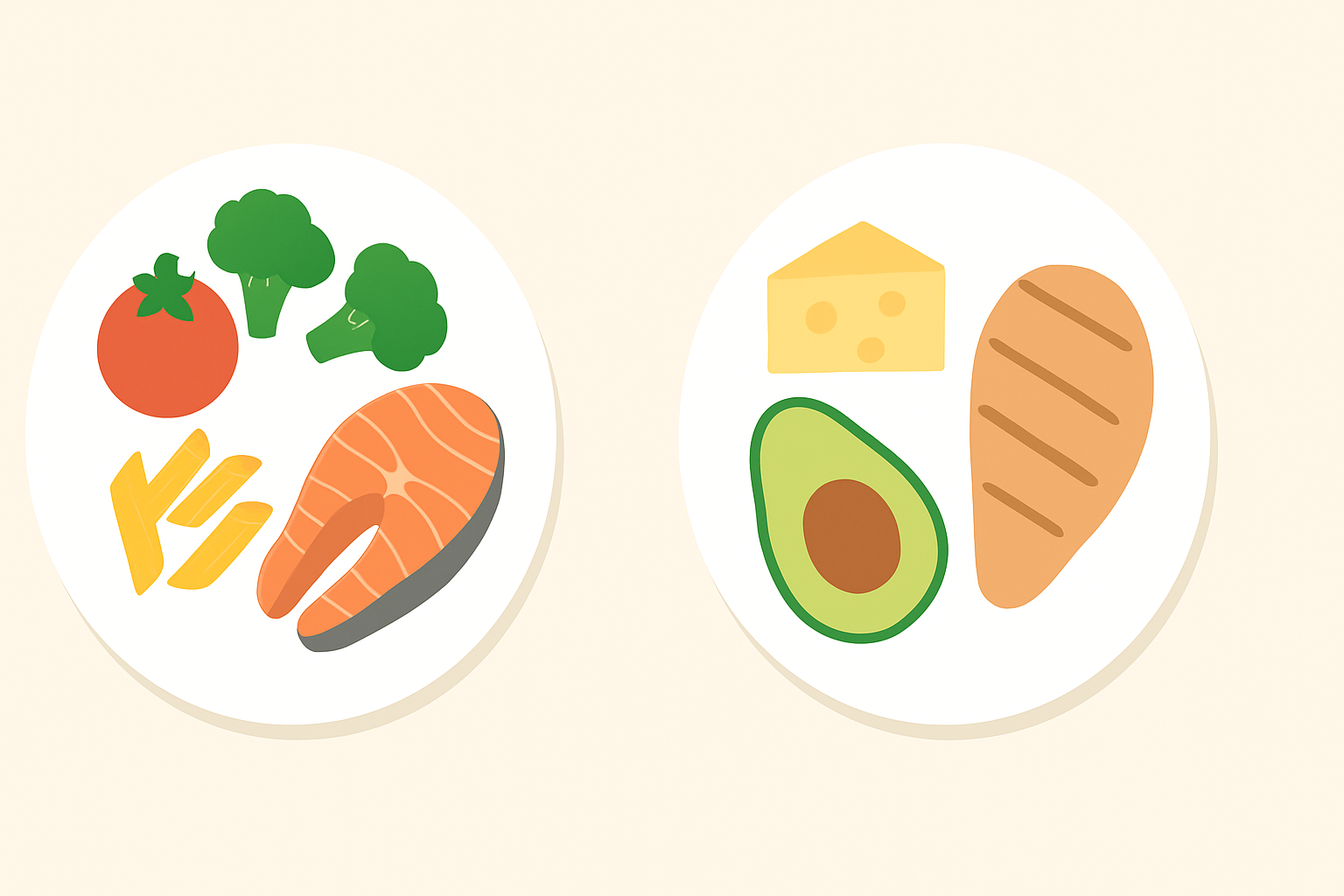Introduction: Navigating the Low Carb vs Keto Debate
In the evolving landscape of nutrition and wellness, dietary strategies like the low carb and ketogenic (keto) diets have garnered significant attention. Both approaches emphasize carbohydrate reduction, yet they diverge in their methodologies and physiological impacts. Understanding the nuances between a low carb diet and a keto diet is essential for individuals aiming to align their eating habits with specific health objectives.
You may also like: Is the Keto Diet Safe or Dangerous? What Experts Say About the Risks, Benefits, and Basics of the Ketogenic Diet

Defining the Low Carb Diet: Flexibility in Carbohydrate Reduction
A low carb diet primarily focuses on reducing carbohydrate intake to improve metabolic health and support weight management. Typically, this diet limits daily carbohydrate consumption to between 50 and 150 grams, allowing for a more flexible approach compared to stricter dietary regimens. This flexibility enables the inclusion of a variety of foods, including certain fruits, vegetables, and whole grains, making it a sustainable option for many individuals.
The primary goal of a low carb diet is to stabilize blood sugar levels and reduce insulin spikes, which can contribute to weight gain and other metabolic issues. By moderating carbohydrate intake, the body shifts towards utilizing fat as a more consistent energy source, potentially leading to improved energy levels and reduced hunger. This approach does not necessarily aim to induce ketosis, a metabolic state where the body burns fat for fuel in the absence of carbohydrates.

Understanding the Ketogenic Diet: Inducing Ketosis for Metabolic Benefits
The ketogenic diet, commonly referred to as the keto diet, is a high-fat, moderate-protein, and very low-carbohydrate eating plan designed to induce a state of ketosis. In ketosis, the body shifts from using glucose as its primary energy source to utilizing ketone bodies derived from fat metabolism. This metabolic adaptation can lead to significant fat loss and has been associated with various health benefits.
To achieve and maintain ketosis, individuals typically restrict their carbohydrate intake to fewer than 50 grams per day, with some variations allowing as little as 20 grams. The macronutrient distribution in a standard keto diet often comprises approximately 70-75% fat, 20-25% protein, and 5-10% carbohydrates. This strict composition requires careful planning and monitoring to ensure adherence and effectiveness.
The ketogenic diet has been utilized therapeutically for conditions such as epilepsy and has shown promise in managing type 2 diabetes and supporting weight loss. However, due to its restrictive nature, it may pose challenges in long-term adherence and requires medical supervision, especially for individuals with underlying health conditions.

Comparing Macronutrient Profiles: Low Carb vs Keto
While both low carb and keto diets reduce carbohydrate intake, their macronutrient compositions differ significantly. A low carb diet allows for a broader range of carbohydrate consumption, typically between 50 to 150 grams per day, and does not necessitate a specific ratio of fats to proteins. This flexibility permits a more varied diet, including a wider selection of fruits, vegetables, and whole grains.
In contrast, the ketogenic diet requires a precise macronutrient balance to maintain ketosis. The high fat content, moderate protein, and minimal carbohydrates necessitate meticulous meal planning and often the exclusion of many carbohydrate-rich foods. This stringent structure aims to keep the body in a continuous state of ketosis, thereby maximizing fat utilization for energy.
Understanding these macronutrient distinctions is crucial for individuals considering either diet, as it influences food choices, meal preparation, and overall dietary sustainability.

Health Benefits: Evaluating the Impact of Low Carb and Keto Diets
Both low carb and keto diets have been associated with various health benefits, particularly concerning weight management and metabolic health. A low carb diet can lead to weight loss by reducing insulin levels and promoting fat utilization. Additionally, it may improve cardiovascular markers, such as triglyceride levels and HDL cholesterol, and aid in blood sugar control for individuals with insulin resistance.
The ketogenic diet, through the induction of ketosis, may offer more pronounced benefits in certain contexts. It has been effective in reducing seizure frequency in epilepsy patients and shows potential in improving glycemic control in type 2 diabetes. Moreover, some studies suggest that the keto diet may enhance mental clarity and energy levels due to the consistent energy supply from ketone bodies.
However, the long-term effects of the ketogenic diet remain under investigation, and its restrictive nature may lead to nutrient deficiencies if not properly managed. Therefore, individuals considering the keto diet should consult healthcare professionals to assess its suitability and ensure nutritional adequacy.

Potential Risks and Considerations: Navigating Dietary Challenges
While both diets offer health benefits, they also present potential risks and challenges. The low carb diet, though more flexible, may still lead to reduced intake of certain nutrients found in carbohydrate-rich foods, such as fiber, vitamins, and minerals. Individuals may experience initial side effects like fatigue or constipation as the body adapts to lower carbohydrate levels.
The ketogenic diet’s restrictive nature increases the risk of nutrient deficiencies, particularly in fiber, B vitamins, and certain minerals. Additionally, some individuals may experience the “keto flu,” characterized by symptoms like headaches, fatigue, and irritability during the initial adaptation phase. Long-term adherence can be challenging, and there is concern about the diet’s impact on lipid profiles, with some studies indicating increased LDL cholesterol levels.
Medical supervision is recommended when undertaking the ketogenic diet, especially for individuals with pre-existing health conditions, to monitor potential adverse effects and ensure nutritional balance.
Suitability and Personalization: Aligning Diet with Health Goals
Choosing between a low carb and keto diet should be guided by individual health goals, lifestyle preferences, and medical considerations. A low carb diet may be more suitable for individuals seeking a sustainable approach to weight management and metabolic health without the strict constraints of ketosis. Its flexibility allows for a broader range of food choices, making it easier to maintain over the long term.
Conversely, the ketogenic diet may be appropriate for individuals with specific medical conditions, such as epilepsy or type 2 diabetes, where ketosis can offer therapeutic benefits. It may also appeal to those seeking rapid weight loss or improved mental clarity. However, due to its restrictive nature, it requires a higher level of commitment and medical oversight.
Personalization is key in dietary planning, and consulting with healthcare professionals can aid in selecting and tailoring a diet that aligns with individual health needs and goals.
FAQ: Low Carb Diet vs Keto — Expert Answers to Common Questions
1. Can someone switch between a low carb diet and keto diet depending on their goals?
Yes, transitioning between a low carb diet and keto diet can be an effective strategy depending on your short-term and long-term health goals. Many individuals begin with a low carb diet keto diet approach to ease into carbohydrate restriction without the rigidity of strict ketosis. Once metabolic flexibility is achieved—meaning your body can efficiently switch between burning carbs and fat—some choose to tighten their carb intake further to enter ketosis for targeted benefits like enhanced mental clarity or rapid fat loss. Conversely, those who initially adopt a keto lifestyle may find the structure too restrictive over time and shift toward a low carb approach to make their diet more sustainable. In the ongoing debate of low carb vs keto, flexibility and personalization often yield the best outcomes, and cyclical transitions between the two may be especially useful for athletes or individuals navigating lifestyle changes.
2. Is it possible to combine aspects of both diets for a more balanced approach?
Blending the principles of the low carb diet keto diet model can provide a hybrid approach that leverages the benefits of each while minimizing their respective challenges. Some nutritionists advocate for a “targeted” or “moderate” ketogenic plan that maintains a relatively low carb intake without the ultra-strict thresholds required for full ketosis. This middle ground allows the body to experience some of the metabolic benefits of reduced carbs—such as better blood sugar control and reduced cravings—without the need to strictly monitor ketone levels. The ketogenic diet vs low carb debate often overlooks this nuanced option, but it can be highly practical for people who value dietary flexibility. Whether you’re looking to boost energy, support hormonal balance, or improve metabolic health, combining the best elements of both approaches can offer a highly personalized and sustainable eating strategy.
3. What psychological or emotional impacts might arise when choosing low carb vs keto diets?
The psychological experience of following a low carb diet vs keto diet can differ dramatically due to the level of restriction involved. Individuals following a ketogenic diet may initially experience mood swings, irritability, or even symptoms of “carb withdrawal,” especially during the first few weeks of adaptation. On the other hand, a low carb diet allows for more dietary freedom, which may ease the psychological burden and support better long-term adherence for some. Emotional well-being also hinges on how the diet aligns with social settings; the keto diet can be isolating at events or gatherings due to its stricter food limitations. From a mental health perspective, many dietitians emphasize the importance of choosing a dietary approach that promotes not only physical health but also emotional balance and lifestyle integration. This is one of the subtler yet important differentiators in the broader conversation of keto diet vs low carb diet strategies.
4. Are there different micronutrient concerns with each approach?
Micronutrient sufficiency is a key consideration when comparing the ketogenic diet vs low carb diet. A keto diet often leads to reduced intake of foods rich in potassium, magnesium, and B vitamins due to the exclusion of fruits, legumes, and whole grains. This can increase the risk of deficiencies unless carefully supplemented or managed with nutrient-dense low-carb vegetables and organ meats. Meanwhile, a low carb diet—due to its broader food range—makes it easier to meet daily requirements for vitamins and minerals, especially fiber and antioxidants. It’s worth noting that both diets benefit from intentional planning and periodic lab assessments to monitor nutrient status. Dietitians recommend using whole food-based supplementation or rotating foods seasonally to ensure coverage, especially if following either the keto or low carb diet long-term.
5. How do athletic performance and energy levels differ on a low carb diet vs keto diet?
Athletic performance is one area where the differences between low carb vs keto diets become particularly evident. While both limit carbohydrate intake, the keto diet’s near-complete reliance on fat as a fuel source can initially impair high-intensity performance, which depends heavily on glycogen. Athletes on keto often experience a dip in endurance or power output during the first few weeks of adaptation, commonly known as the “keto lag.” In contrast, a low carb diet still permits enough carbs to replenish glycogen stores post-exercise, making it more suitable for athletes engaged in strength training or mixed-modal sports. Over time, fat-adapted keto athletes can perform well in endurance events, but those requiring explosive energy often fare better with the more flexible carb intake seen in low carb diet keto diet hybrids. Tailoring carb timing—such as eating them around workouts—can also bridge the performance gap.
6. How do these diets influence long-term cardiovascular health differently?
When analyzing cardiovascular outcomes in the context of low carb diet vs keto, it’s critical to distinguish between short-term biomarker shifts and long-term risk. The keto diet can lead to a temporary rise in LDL cholesterol in some individuals, particularly those genetically predisposed to hyper-responders. However, it often improves HDL cholesterol and lowers triglycerides, creating a complex cardiovascular risk profile that must be interpreted holistically. A low carb diet tends to offer more modest improvements across lipid markers without the same degree of LDL variability, making it potentially safer for individuals with a family history of heart disease. In the ongoing low carb vs keto debate, cardiologists often stress the importance of personalized lab monitoring and, in some cases, recommend integrating more monounsaturated fats over saturated ones to optimize outcomes regardless of the dietary approach chosen.
7. Are there professional guidelines for transitioning safely into ketosis from a low carb diet?
Medical professionals and dietitians often recommend a staged approach when moving from a low carb diet to a ketogenic diet, especially to minimize discomfort and metabolic stress. Gradually reducing carbohydrate intake over a period of two to four weeks helps the body adapt to lower glucose availability and can reduce the severity of symptoms like fatigue or “keto flu.” During this time, increasing electrolyte intake—particularly sodium, potassium, and magnesium—is crucial for maintaining fluid balance as the body sheds excess water and glycogen. Additionally, increasing dietary fat slowly and ensuring adequate protein helps mitigate muscle loss while preserving energy. This measured transition acknowledges the differences between low carb diet keto diet strategies and ensures a more sustainable shift, particularly for individuals with higher baseline carb intakes or those new to structured dieting.
8. How do gut health outcomes differ between the two diets?
The impact of the ketogenic diet vs low carb diet on gut health can vary significantly based on fiber intake and microbial diversity. A strict keto diet often limits fibrous foods such as legumes, whole grains, and high-fiber fruits, which can reduce microbial diversity in the gut over time. This may result in symptoms such as constipation or reduced production of short-chain fatty acids, which are essential for colon health. In contrast, a low carb diet typically includes a broader range of prebiotic fibers and polyphenols, supporting a healthier microbiome and more regular digestion. Integrating fermented foods, resistant starches from cooled potatoes or green bananas, and leafy greens can help preserve gut health on either plan, but is especially crucial when adhering to the stricter food exclusions associated with keto. Gastroenterologists often highlight these nuances when patients ask about keto diet vs low carb diet in the context of digestive well-being.
9. What are the emerging innovations or trends in the world of low carb and keto nutrition?
As the popularity of both low carb and keto diets continues to grow, so does the innovation within the space. New product lines, such as low glycemic baked goods, plant-based keto alternatives, and exogenous ketone supplements, are reshaping how these diets are practiced. The medical community is also exploring therapeutic keto applications beyond epilepsy, including potential roles in neurodegenerative disease management, polycystic ovary syndrome (PCOS), and certain cancers. Additionally, continuous glucose monitors (CGMs) are becoming popular among low carb and keto dieters, offering real-time feedback on metabolic responses to foods. These tools allow users to better understand their personal thresholds, improving adherence and optimizing metabolic flexibility. In the context of low carb diet vs keto, these technologies and food innovations are blurring the lines, enabling more personalized and data-driven approaches to nutrition.
10. Can a low carb or keto lifestyle be adapted to plant-based or vegetarian eating patterns?
Although often associated with animal-based products, both the keto and low carb diet can be adapted to suit vegetarian and even vegan lifestyles with careful planning. In a low carb vegetarian diet, incorporating eggs, full-fat dairy, tofu, and low carb vegetables provides a solid nutritional base. The ketogenic version is more challenging due to the higher fat and lower carb demands but can be achieved using coconut oil, avocados, nuts, seeds, and plant-based protein powders. Many nutritionists stress that understanding the differences between the ketogenic diet vs low carb diet is essential before attempting a plant-based version, as the restricted food list narrows further. Supplementation with nutrients such as vitamin B12, iron, and omega-3 fatty acids becomes even more critical in this context. This innovative and ethical dietary fusion highlights how keto diet vs low carb diet paradigms can evolve with cultural, environmental, and personal values in mind.
Conclusion: Making Informed Dietary Choices for Optimal Health
In the discourse of low carb diet vs keto, understanding the distinctions between these dietary approaches is essential for making informed health decisions. Both diets offer pathways to improved metabolic health and weight management, yet they differ in structure, sustainability, and suitability for individual health profiles.
A low carb diet provides a flexible framework that can be adapted to various lifestyles and may serve as a long-term strategy for health maintenance. The ketogenic diet, while potentially offering more pronounced benefits in specific contexts, demands a higher level of commitment and medical supervision.
Ultimately, the choice between a low carb and keto diet should be individualized, considering personal health goals, preferences, and medical history. Engaging with healthcare providers and registered dietitians can facilitate the development of a personalized dietary plan that promotes health and well-being.
Further Reading:
Is a low-carb or keto diet right for you?


